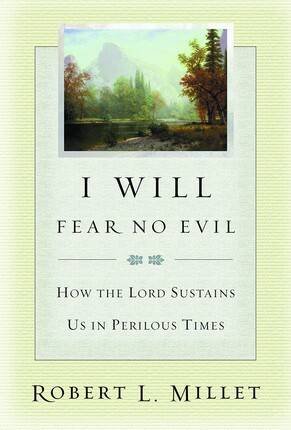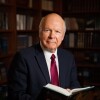As we move closer and closer to the end of time, meaning the end of earth’s temporal existence, the forces of evil will be combined against the forces of good, particularly the Church of the Lamb of God. A proclamation issued by the Quorum of the Twelve Apostles in April 1845 includes these words: “As this work progresses in its onward course, and becomes more and more an object of political and religious interest and excitement, no king, ruler, or subject, no community or individual, will stand neutral. All will at length be influenced by one spirit or the other; and will take sides either for or against the kingdom of God.”
Thus we should not be surprised or startled when individuals or whole organizations take issue with or condemn outright the teachings or practices of The Church of Jesus Christ of Latter-day Saints. We have the assurance that there will never again be an apostasy of the Lord’s Church, that the kingdom of God is here to stay and will grow and expand to include hundreds of millions of people throughout the earth. Indeed, as Moroni predicted, “Those who are not built upon the Rock will seek to overthrow this church; but it will increase the more opposed.”
“We are not without critics,” President Gordon B. Hinckley observed, “some of whom are mean and vicious. We have always had them, and I suppose we will have them all through the future. But we shall go forward, returning good for evil, being helpful and kind and generous.”
Let me also share three suggestions—learned through both sad and sweet experience—on how we might effectively deal with difficult questions posed by those not of our faith.
First, stay in control of yourself.
There is nothing more frustrating than knowing the truth, loving the truth, sincerely desiring to share the truth, and yet being unable to communicate our deepest feelings to another who sees things differently. Argument or disputation over sacred things causes us to forfeit the Spirit of God and thus the confirming power of our message (3 Nephi 11:28–30). We teach and we testify. Contention is unbecoming of one called to publish peace and thus bless our brothers and sisters. In the words of Elder Marvin J. Ashton, “We have no time for contention. We only have time to be about our Father’s business.”
In 1896 President Joseph F. Smith wrote to one of his missionary sons: “Kindness will beget friendship and favor, but anger or passion will drive away sympathy. To win one’s respect and confidence, approach them mildly, kindly. No friendship was ever gained by an attack upon principle or upon man, but by calm reason and the lowly Spirit of Truth. If you have built for a man a better house than his own, and he is willing to accept yours and forsake his, then, and not till then, should you proceed to tear down the old structure. Rotten though it may be, it will require some time for it to lose all its charms and fond memories of its former occupant. Therefore let him, not you, proceed to tear it away. Kindness and courtesy are the primal elements of gentility.”
Second, stay in order.
The Savior taught that gospel prerequisites should be observed when teaching sacred things (Matthew 7:6–7).
A person, for example, who knows very little about our doctrine will probably not understand or appreciate our teachings concerning temples, sealing powers, eternal life, or the deification of man. The Prophet Joseph Smith explained that “if we start right, it is easy to go right all the time; but if we start wrong, we may go wrong, and it [will] be a hard matter to get right.”
It is always wise to lay a proper foundation for what is to be said; the truth can then flow more freely.
Third, stay in context.
We love the Bible and cherish its messages. But the Bible is not the source of our doctrine or authority, nor is much to be gained through efforts to “prove” the truthfulness of the restored gospel from the Bible. Ours is an independent revelation. We know what we know about the premortal existence, priesthood, celestial marriage, baptism for the dead, the postmortal spirit world, degrees of glory, and so forth, because of what God has made known through latter-day prophets, not because we are able to identify a few biblical allusions to these matters.
Some of our greatest difficulties in handling questions about our faith come when we try to establish specific doctrines of the Restoration from the Bible alone. We have an obligation—a sacred obligation—to rely upon the Book of Mormon, the Doctrine and Covenants, the Pearl of Great Price, the Joseph Smith Translation of the Bible, and especially the teachings of latter-day apostles and prophets, in establishing our doctrine. There is consummate peace and spiritual power to be derived from being loyal and true to those things the Almighty has communicated to us in our dispensation (D&C 5:10; 31:3–4; 43:15–16; 49:1–4; 84:54–61).
In September 1832 the Lord warned of a condemnation, a scourge, and a judgment that would rest upon the whole Church until we took seriously the Book of Mormon and the revelations of the Restoration (D&C 84:54–61). In short, there is a loyalty that should and must exist among us, a loyalty to those things the Lord has given to us. We are commanded to “declare glad tidings.” And what are those tidings? Are we to go into the world and reteach the Sermon on the Mount, the Bread of Life sermon, or any of those remarkable doctrines contained in the New Testament? As we have said before, we cherish the Bible and seek to safeguard its truths, but we are called upon, in the words of the Lord, to “declare the things which have been revealed to my servant, Joseph Smith, Jun.” (D&C 31:3–4).
While we seek to make friends and build bridges of understanding where possible, we do not court favor, nor do we compromise one whit on what we believe. Some doctrines, like the doctrine of “the only true and living church” (D&C 1:30), by their very nature, arouse antagonism from those of other faiths. Would it not be wise, some have asked, to avoid or at least downplay such divisive points? Perhaps, some say, we should consider focusing on matters we have in common and put aside, for the time being, the distinctive teachings of the Restoration. Elder Boyd K. Packer declared: “If we thought only in terms of diplomacy or popularity, surely we should change our course.
“But we must hold tightly to it even though some turn away. ...
“It is not an easy thing for us to defend the position that bothers so many others.
“Brethren and sisters, never be ashamed of the gospel of Jesus Christ. Never apologize for the sacred doctrines of the gospel.
“Never feel inadequate and unsettled because you cannot explain them to the satisfaction of all who might inquire of you.
“Do not be ill at ease or uncomfortable because you can give little more than your conviction. ...
“If we can stand without shame, without hesitancy, without embarrassment, without reservation to bear witness that the gospel has been restored, that there are prophets and Apostles upon the earth, that the truth is available for all mankind, the Lord’s Spirit will be with us. And that assurance can be affirmed to others.”
President Gordon B. Hinckley declared: “If we will go forward, never losing sight of our goal, speaking ill of no one, living the great principles we know to be true, this cause will roll on in majesty and power to fill the earth. Doors now closed to the preaching of the gospel will be opened. The Almighty, if necessary, may have to shake the nations to humble them and cause them to listen to the servants of the living God. Whatever is needed will come to pass.”
This work is true, and because it is true it will triumph. The destiny of the restored kingdom is set, and we need not fear for the success of the Church. The repeated plea in scripture is “Fear not.” The promise of Deity is encouraging and strengthening to our faith: “Verily, thus saith the Lord unto you—there is no weapon that is formed against you shall prosper; and if any man lift his voice against you he shall be confounded in mine own due time. Wherefore, keep my commandments; they are true and faithful. Even so. Amen” (D&C 71:9–11; compare 136:17). God will bring to pass his purposes; of that we can rest assured.
Lead image from Getty Images
Filled with insights from the prophets, both ancient and modern, and further brought to life with personal examples, I Will Fear No Evil is a timely and thoughtful book to calm our fears and sustain our faith in times of distress.
Although our world often seems locked in a downward spiral, we can find reassurance in the prophetic promise that this era of turmoil, strife, and war can also be a time of growth, unity, and peace. And we can take comfort in the words of the twenty-third Psalm: 'Though I walk through the valley of the shadow of death, I will fear no evil: for [God is] with me' (v. 4).




